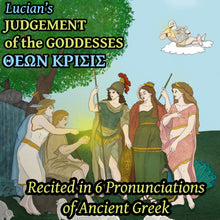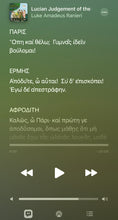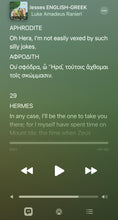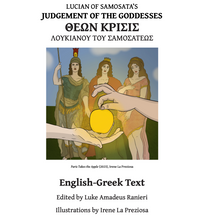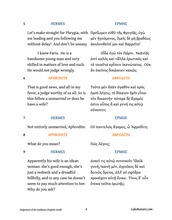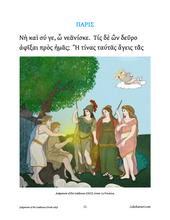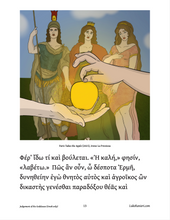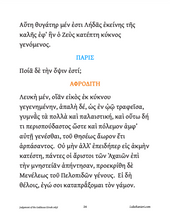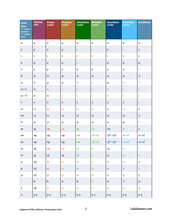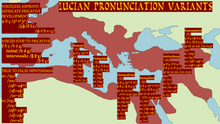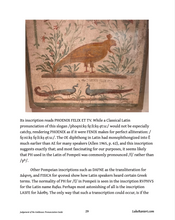
Lucian's satyrical dialogue "Judgement of the Goddesses" Audiobook & Macronized Text
• Audio files of the recitation of the original Greek dialogue in six Ancient Greek Pronunciations
• A version of the Greek dialogue recited with English before each line so you can learn the context, preceded by the audiobook version of the introduction and pronunciation guide (this way you know what all the phonetic symbols are supposed to sound like!)
• PDF files, including the original Greek dialogue, as well as English-Greek side-by-side text — the Greek text is fully macronized!
• Ancient Greek Pronunciation Guide, detailing the changing sound of Greek during the Roman Classical Period, and in-depth explanation of the ancient sources for the six variants of Lucian Pronunciation
My Theōdōrēi tier patrons on Patreon get this entire audiobook for free! So consider signing up to be a patron at patreon.com/LukeRanieri.
In the audiobook you will hear a recording of the satyrical dialogue Judgement of the Goddesses (Θεῶν Κρίσις) by Lucian of Samosata, recorded in six variants of Lucian Pronunciation:
ZEUS speaks in ROMAIC LUCIAN Pronunciation
APHRODITE speaks in POMPEIAN LUCIAN Pronunciation
HERA speaks in ALEXANDRINE LUCIAN Pronunciation
ATHENA speaks in MEMPHITE LUCIAN Pronunciation
HERMES speaks in SAMOSATENE LUCIAN Pronunciation
PARIS speaks in ANTIOCHENE LUCIAN Pronunciation
WHY LUCIAN'S JUDGEMENT OF THE GODDESSES?
Lucian’s writing is famous for its wit and humor, as well as excellent usage of the Classical Attic style. It is also one of the shortest pieces written by Lucian, and happens to contain six characters; for this reason, it seemed a perfect opportunity to demonstrate six standardized variants of Lucian Pronunciation.
The audiobook and accompanying text begins with a discussion of Ancient Greek phonology, including guides to pronunciation, followed by three versions of the unabridged dialogue Judgement of the Goddesses.
Recitation 1: The dialogue with an English translation of each character’s lines preceding the original Greek; the point of this recording is to help those not accustomed to listening to more advanced Ancient Greek texts understand the context before hearing the spoken Greek.
Recitation 2: The plain Greek dialogue, with the names of each character announced before they speak. The third is the same Greek dialogue, but the names are no longer announced. As each character speaks in a distinct manner with a particular accent (technically, a pronunciation variant), it is possible to recognise who is talking without the names mentioned, especially if you have already familiarized yourself with the dialogue by listening to the first two renditions
Recitation 3: This rendition also includes background music which has been selected to suggest the personality of the primary character speaking in any given scene, a species of leitmotif, thus further aiding the listener in following which person is talking.
In the pronunciation guide, I discuss phonology in terms of International Phonetic Alphabet (IPA) symbols, but don't worry: by the end of the guide, you'll be an expert!
Following the commentary on pronunciation is the the fully macronized text of Judgement of the Goddesses with accompanying English translation.
HOW DO USE THIS AUDIOBOOK & SUPPORTING MATERIALS
Once you receive the link for digital download, DOWNLOAD THE FILE ON A COMPUTER, not a mobile device, unless you are particularly savvy with mobile devices (this is generally not recommended, however). Unzip the compressed file. In it are the PDFs and audio files. You will have to manually transfer the audio files to the music or audiobooks application/program of your choice, and syncronize the audio files to mobile devices, etc., in the way that makes sense for your digital ecosystem; for example, on a Mac, place the files in the Music application, and sync it with the Music application on your iPhone.
While there are many ways to enjoy this audiobook, the audience I have in mind are listeners with native or strong English proficiency interested in using the English text to improve their understanding of Ancient Greek, and who might be curious as to the diversity of pronunciations during the Classical Roman Period.
After listening to the audiobook's recitations several times, you will be able to follow all the events in the Greek dialogue without English transation, as you will be familiar with the story. This will improve your ability to focus details of Greek vocabulary and grammar in the dialogue, and also help you to understand Ancient Greek spoken in various pronunciation conventions.
Here is how I imagine you might use the audio material: while reading along with the PDF, listen to the first recitation with the English translation. Then proceed to the Greek only recitation, and finally to the recitation with music.
While I imagine the most intensive version of this experience will be accomplished on a computer, you will likely wish to synchronize the audio files with your mobile device. To further aid you in this respect, I have attached the dialogue's text to the audio files themselves as lyrics metadata, so most will be able to visualize the text via the Lyrics feature (as it is called in the iOS Music app) while listening. (If for some reason your audio player does not show the lyrics, you can investigate ways to copy and paste the text from the PDF into each track in the application of your choice if you want this.)
N.B. The expectation is that these audio files will be downloaded on a computer, and then transferred to mobile devices through the appropriate synchronization process, such as iTunes Match and Apple Music for the Apple ecosystem. Other ecosystems may work differently.












